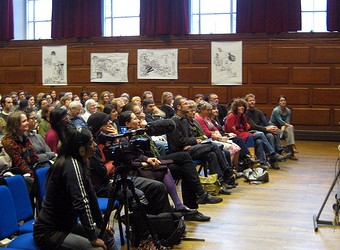Core Question:
Market: What can be bought and sold?
Commons: What do we need to live?
Idea of the Individual:
Market: Humans maximize benefits for themselves
Commons: Humans are primarily cooperative social beings
Social Practice:
Market: Competition predominates; we prevail at the expense of others
Commons: Cooperation predominates; commoning connects us with others
Power Relations:
Market: Centralization & monopoly
Commons: Decentralization & collaboration
Change Agents:
Market: Powerful political lobbies focus on institutionalized politics and government
Commons: Diverse communities working as distributed networks, with solutions coming from the margins
Decisionmaking:
Market: Hierarchical, top-down; command & control
Commons: Horizontial, bottom-up, decentralized, self-organized
Decision Principle:
Market: Majority rule(s)
Commons: Consensus
Property Relations:
Market: Exclusive private property: "I can do anything I want with what I own"
Commons: Collectively used possession: "I am co-responsible for what I co-use"
Core Focus:
Market: Market exchange and economic growth (GDP) is achieved through individual initiative, innovation and "efficiency"
Commons: Common weath and sustainable livelihoods is achieved through cooperation
Resources:
Market: Scarcity is maintained or created through social barriers and exclusions
Commons: There is enough for all through sharing (of finite resources) and a sense of abundance (of limitless resources)
Results for Resources:
Market: Depletion, exploitation, enclosure
Commons: Conservation, maintenance, reproduction, expansion
Knowledge:
Market: Knowledge regarded as scarce asset to be bought and sold
Commons: Knowledge regarded as a plentiful asset for the common good of society
Relationships to Nature & Other Humans:
Market: Separation
Commons: Interrelational
Society:
Market: Individual vs. collective interest >exclusion
Commons: My personal unfolding is a condition for the development of others, and vice-versa. >Emancipation through convival connections





